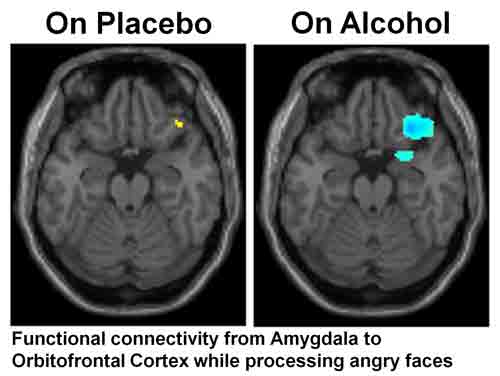Alcohol intoxication reduces communication between two areas of the brain that work together to properly interpret and respond to social signals, according to researchers at the University of Illinois at Chicago College of Medicine.
Their results were published in the September issue of Psychopharmacology.
Previous research has shown that alcohol suppresses activity in the amygdala, the area of the brain responsible for perceiving social cues such as facial expressions.
“Because emotional processing involves both the amygdala and areas of the brain located in the prefrontal cortex responsible for cognition and modulation of behavior, we wanted to see if there were any alterations in the functional connectivity or communication between these two brain regions that might underlie alcohol’s effects,” said K. Luan Phan, UIC professor of psychiatry.
Phan and colleagues examined alcohol’s effects on connectivity between the amygdala and the prefrontal cortex during the processing of emotional stimuli – photographs of happy, fearful and angry faces – using functional magnetic resonance imaging, or fMRI, an imaging technique that allows researchers to see which areas of the brain are active during the performance of various tasks.
Participants were 12 heavy social drinkers (10 men, two women) with an average age of 23. Their reported average of 7.8 binge drinking episodes per month – defined as consuming five or more drinks for men, and four or more drinks for women –put them at high risk for developing alcohol dependence.
The participants were given a beverage containing either a high dose of alcohol (16 percent) or placebo. They then had an fMRI scan as they tried to match photographs of faces with the same expression.
They were shown three faces on a screen – one at the top and two at the bottom — and were asked to pick the face on the bottom showing the same emotion as the one on top. The faces were angry, fearful, happy or neutral.
When participants processed images of angry, fearful and happy faces, alcohol reduced the coupling between the amygdala and the orbitofrontal cortex, an area of the prefrontal cortex implicated in socio-emotional information processing and decision-making.
The researchers also noticed that alcohol reduced the reaction in the amygdala to threat signals — angry or fearful faces.
“This suggests that during acute alcohol intoxication, emotional cues that signal threat are not being processed in the brain normally because the amygdala is not responding as it should be,” Phan said.
“The amygdala and the prefrontal cortex have a dynamic, interactive relationship. How the amygdala and prefrontal cortex interact enables us to accurately appraise our environment and modulate our reactions to it,” Phan said. “If these two areas are uncoupled, as they are during acute alcohol intoxication, then our ability to assess and appropriately respond to the non-verbal message conveyed on the faces of others may be impaired. This research gives us a much better idea of what is going on in the brain that leads to some of the maladaptive behaviors we see in alcohol intoxication including social disinhibition, aggression and social withdrawal.”
Stephanie Gorka and Daniel Fitzgerald from UIC and Andrea King from the University of Chicago also contributed to this research.
This research was supported by a Brain Research Foundation Grant.


Frankly, if you grew up (as I did) in an emotionally harsh environment, you might WANT to cut communication between these two areas of the brain– to make yourself less aware of potentially threatening behavior from others, after many years of exhausting “hyper-vigiliance.”